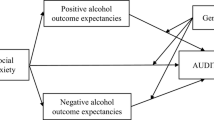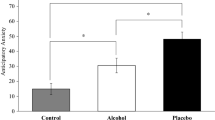Abstract
This preliminary study examined the relationship between social anxiety and specificity of positive alcohol outcome expectancies (AOE) in a community sample of 62 drinking adults. The sample was divided into subsets of socially anxious (n = 17) and nonsocially anxious (n = 45) men and women. The Drinking Expectancy Questionnaire (DEQ) and Alcohol Expectancies in Social Evaluative Situations Scale (AESES) were used to determine if groups differed in the general positive AOE they hold, or only in AOE specific to social situations. ANOVAs revealed that socially anxious individuals had greater positive AOE specific to social situations (DEQ—Assertion scale and AESES) than nonsocially anxious individuals, with no differences in other positive AOE. Partial correlations controlling for social anxiety revealed that AOE specific to social situations correlated with greater drinking and alcohol dependency levels. Findings indicate that identification of AOE specific to social situations may be useful in classifying socially anxious individuals at risk for alcoholism and as a focus of expectancy challenge strategies for individuals with co-occurring social anxiety and drinking problems.
Similar content being viewed by others
References
American Psychiatric Association. (1994). Diagnostic and statistical manual of mental disorders (4th ed.). Washington, DC: Author.
Ballenger, J. C., Davidson, J. R., Lecrubier, Y., Nutt, D. J., Bobes, J., Beidel, D. C., (1998). Consensus statement on social anxiety disorder from the International Consensus Group on Depression and Anxiety. Journal of Clinical Psychiatry, 59, 54–60.
Brown, S. A., Goldman, M. S., Inn, A., & Anderson, L. R. (1980). Expectations of reinforcement by alcohol: Their domain and relation to drinking patterns. Journal of Consulting and Clinical Psychology, 48, 419–426.
Bruch, M. A., Heimberg, R. G., Harvey, C. H., McCann, M., Mahone, M., & Slavkin, S. (1992). Shyness, alcohol expectancies, and alcohol use: Discovery of a suppressor effect. Journal of Research in Personality, 23, 137–149.
Bruch, M. A., Rivet, K. M., Heimberg, R. G., & Levin, M. A. (1997). Shyness, alcohol expectancies, and drinking behavior: Replication and extension of a suppressor effect. Personality and Individual Differences, 22, 193–200.
Cahalan, D., Cissin, I. H., & Crossley, H. M. (1969). American drinking practices: A national survey of drinking behavior and attitudes. Monographs of the Rutgers Center of Alcohol Studies, 6.
Carrigan, M. H., & Randall, C. L. (2003). Self-medication in social phobia: A review of the alcohol literature. Addictive Behaviors, 28, 269–284.
Chambless, D. L., Cherney, J., Caputo, G. C., & Rheinstein, B. J. G. (1987). Anxiety disorders and alcoholism: A study with inpatient alcoholics. Journal of Anxiety Disorders, 1, 29–40.
Clark, D. M., & McManus, F. (2002). Information processing in social phobia. Biological Psychiatry, 51, 92–100.
Conger, J. J. (1956). Reinforcement theory and the dynamics of alcoholism. Quarterly Journal of Studies on Alcohol, 17, 296–305.
Darkes, J., & Goldman, M. S. (1993). Expectancy challenge and drinking reduction: Experimental evidence for a mediational process. Journal of Consulting and Clinical Psychology, 61, 344–353.
Davidson, J. R. T., Hughes, D. L., George, L. K., & Blazer, D. G. (1993). The epidemiology of social phobia: Findings from the Duke Epidemiological Catchment Area Study. Psychological Medicine, 23, 709–718.
Davidson, R., & Raistrick, D. (1986). The validity of the Short Alcohol Dependence Data (SADD) Questionnaire: A short self-report questionnaire for the assessment of alcohol dependence. British Journal of Addiction, 81, 217–222.
de Boer, M. C., Schippers, G. M., & van der Staack, C. P. (1993). Alcohol and social anxiety in women and men: Pharmacological and expectancy effects. Addictive Behaviors, 18, 117–126.
Eggleston, A. M., Woolaway-Bickel, K., & Schmidt, N. B. (2004). Social anxiety and alcohol use: Evaluation of the moderating and mediating effects of alcohol expectancies. Journal of Anxiety Disorders, 18, 33–49.
Fromme, K., Stroot, E., & Kaplan, D. (1993). Comprehensive effects of alcohol: Development and psychometric assessment of a new expectancy questionnaire. Psychological Assessment, 5, 19–26.
Goldman, M. S., Del Boca, F. K., & Darkes, J. (1999). Alcohol expectancy theory: The application of cognitive neuroscience. In K. E. Leonard & H. T. Blane (Eds.), Psychological theories of drinking and alcoholism (2nd ed., pp. 203–246). New York: Guilford Press.
Gorman, D. M., Duffy, S. W., Raine, S., & Taylor, C. L. (1989). Level of agreement between questionnaire measures of alcohol dependence, alcoholism, and problem drinking in a sample presenting at a specialist alcohol treatment service. Drug and Alcohol Dependence, 24, 227–232.
Guarna, J., & Rosenberg, H. (2000). Influence of dose and beverage type instructions on alcohol outcome expectancies of DUI offenders. Journal of Studies on Alcohol, 61, 341–344.
Ham, L. S., & Hope, D. A. (in press). Incorporating social anxiety into a model of college problem drinking. Addictive Behaviors.
Ham, L. S., Hope, D. A., White, C. S., & Rivers, P. C. (2002). Alcohol expectancies and drinking behavior in adults with social anxiety disorder and dysthymia. Cognitive Therapy and Research, 26, 275–288.
Heimberg, R. G., Mueller, G. P., Holt, C. S., Hope, D. A., & Liebowitz, M. R. (1992). Assessment of anxiety in social interaction and being observed by others: The Social Interaction Anxiety Scale and the Social Phobia Scale. Behavior Therapy, 23, 53–73.
Higgins, R. L., & Marlatt, G. A. (1973). Effects of anxiety arousal on the consumption of alcohol by alcoholics and social drinkers. Journal of Consulting and Clinical Psychology, 41, 426–433.
Higgins, R. L., & Marlatt, G. A. (1975). Fear of interpersonal evaluation as a determinant of alcohol consumption in male social drinkers. Journal of Abnormal Psychology, 84, 644–655.
Himle, J. A., & Hill, E. M. (1991). Alcohol abuse and the anxiety disorders: Evidence from the Epidemiologic Catchment Area Survey. Journal of Anxiety Disorders, 5, 237–245.
Hope, D. A., & Heimberg, R. G. (1993). Social phobia and social anxiety. In D. H. Barlow (Ed.), Clinical handbook of psychological disorders: A step-by-step treatment manual (pp. 99–136). New York: Guilford.
Jones-Madsen, L., Silvia-Young, L., & Richman, C. K. (1995). Increased awareness and self-challenge of alcohol expectancies. Substance Abuse, 16, 77–85.
Kessler, R. C., Crum, R. M., Warner, L. A., Nelson, C. B., Schulenberg, J., & Anthony, J. C. (1997). Lifetime co-occurrence of DSM-III-R alcohol abuse and dependence with other psychiatric disorders in the National Comorbidity Survey. Archives of General Psychiatry, 54, 313–321.
Khantzian, E. J. (1995). The self-medication hypothesis of addictive disorders: Focus on heroin and cocaine dependence. American Journal of Psychiatry, 142 1259–1264.
Kidorf, M., & Lang, A. R. (1999). Effects of social anxiety and alcohol expectancies on stress-induced drinking. Psychology of Addictive Behaviors, 13, 134–142.
Kushner, M. G., Abrams, K., & Borchardt, C. (2000). The relationship between anxiety disorders and alcohol use disorders: A review of major perspectives and findings. Clinical Psychology Review, 20, 149–171.
Mattick, R. P., & Clarke, J. C. (1989). Development and validation of measures of social phobia scrutiny fear and social interaction anxiety. Behaviour Research and Therapy, 36, 455–470.
McMurran, M., & Hollin, C. R. (1989). The Short Alcohol Dependence Data (SADD) Questionnaire: Norms and reliability data for young male offenders. British Journal of Addiction, 84, 315–318.
Randall, C. L., Thomas, S., & Thevos, A. K. (2001). Concurrent alcoholism and social anxiety disorder: A first step toward developing effective treatments. Alcoholism: Clinical and Experimental Research, 25, 210–220.
Rohsenow, D. J. (1982). Social anxiety, daily moods, and alcohol use over time among heavy social drinking men. Addictive Behaviors, 7, 311–315.
Sayette, M. A. (1999). Does drinking reduce stress? Alcohol Research and Health, 23, 250–255.
Schneider, U., Altmann, A., Baumann, M., Bernzen, J., Bertz, B., Bimber, U., (2001). Comorbid anxiety and affective disorders in alcohol-dependent patients seeking treatment: The first multicentre study in Germany. Alcohol and Alcoholism, 36, 219–223.
Sher, K. J., & Walitzer, K. S. (1986). Individual differences in the stress–response-dampening effect of alcohol: A dose–response study. Journal of Abnormal Psychology, 95, 159–167.
Thomas, S. E., Randall, C. L., & Carrigan, M. H. (2003). Drinking to cope in socially anxious individuals: A controlled study. Alcoholism: Clinical and Experimental Research, 27, 1937–1943.
Tran, G. Q., & Haaga, D. A. F. (2002). Coping responses and alcohol outcome expectancies in alcohol abusing and nonabusing social phobics. Cognitive Therapy and Research, 26, 1–17.
Tran, G. Q., Haaga, D. A. F., & Chambless, D. L. (1997). Expecting that alcohol use will reduce social anxiety moderates the relation between social anxiety and alcohol consumption. Cognitive Therapy and Research, 21(5), 535–553.
Turk, C. L., Fresco, D. M., & Heimberg, R. G. (1999). Cognitive behavior therapy. In M. Hersen & A. S. Bellack (Eds.), Handbook of comparative interventions for adult disorders (pp. 287–316). New York: Wiley.
Weingardt, K. R., Baer, J. S., Kivlahan, D. R., Roberts, L. J., Miller, E. T., & Marlatt, G. A. (1998). Episodic heavy drinking among college students: Methodological issues and longitudinal perspectives. Psychology of Addictive Behaviors, 12, 155–167.
Wiers, R. W., Hartgers, C., van den Brink, W., Gunning, G. W., & Sergeant, J. A. (2000). A confirmatory analysis of the hierarchical structure of positive and negative dose-related alcohol expectancies in alcoholics and the associations with family history of alcoholism. Journal of Studies on Alcohol, 61, 177–186.
Young, R. M., & Knight, R. G. (1989). The Drinking Expectancy Questionnaire: A revised measure of alcohol-related beliefs. Journal of Psychopathology and Behavioral Assessment, 11, 99–112.
Author information
Authors and Affiliations
Corresponding author
Rights and permissions
About this article
Cite this article
Ham, L.S., Carrigan, M.H., Moak, D.H. et al. Social Anxiety and Specificity of Positive Alcohol Expectancies: Preliminary Findings. J Psychopathol Behav Assess 27, 115–121 (2005). https://doi.org/10.1007/s10862-005-5385-x
Accepted:
Issue Date:
DOI: https://doi.org/10.1007/s10862-005-5385-x




